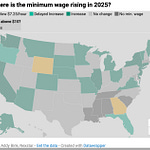This post goes out to both free and paid subscribers, but if you are not already a paid subscriber and value this effort and our growing community, please consider upgrading to a paid membership. Thanks in advance for your financial support of my work —it’s what allows me to keep researching and writing. And thanks to all the new paid yearly subscribers who signed up during our winter sale! You are appreciated!
“US President Joe Biden is proposing a huge increase in fuel taxes for private jets. It is being pitched as a fairness issue compared with airline passengers, who pay special taxes on every ticket.” EuroNews.Green, 3/12/24
The above photo from the Sundance Resort is about it for the positive environmental news…. Wait, there is at least one initiative brewing that might put a dent in our climate crisis, plus a few other items of interest. Read on.
— First up is President Biden’s proposal to gradually increase the tax on private jet fuel as part of his Fiscal Year 2025 budget proposal released a few weeks ago. The president believes it will help even the playing field between the wealthy and average Americans. Currently, commercial airline passengers pay the largest share of upkeep of airports and national airspace:
Airline passengers pay a 7.5% excise tax on tickets and a separate levy of up to $4.50 per flight to help pay for airport projects.
On the other hand:
The [Biden] administration says that private jets account for 7% of all flights handled by the FAA but less than 1% of taxes that fund the federal trust fund for aviation and airports. The Transportation Department said the proposal would raise $1.1 billion over five years.
Under this new proposal, the tax on private jet fuel would gradually increase from the current 22 cents/gal. to $1.06/gal over five years. Of course, the largest aviation industry trade group came out against this modest tax increase, “saying private jets help companies succeed and create jobs.” Really now? That statement might well be true, but it has nothing to do with a choice by the government to ease the burden on the average American and finally require the wealthy to pay their fair share. I can’t help but believe these lobbyists keep making the same, tired arguments because it’s all they’ve got…and it is still an embarrassment.
— According to a CNN Business article published on March 15, approximately 1000 “dollar stores” plan to close around the country in the next few years. Some say good riddance and others worry the closings will further diminish the shopping choices in underserved communities. (I’m in the “good riddance” camp —they sell cheap brands made overseas, and almost entirely ultra-processed “food-like substances” , —a phrase popularized by the writer, Michael Pollan— and pay their workers poorly).
A year ago, I wrote about the proliferation of dollar store brands and some communities’ attempts to ban them. And whether the bans have worked or the brands have concluded that expansion in numbers did not bring expansion in profits, the companies—Family Dollar, Dollar Tree and Dollar General—are closing fairly rapidly.
She [Tulsa City , Oklahoma Councilor Vanessa Hall-Harper], hopes that the recent Family Dollar closures will make it easier for local grocers to open. The expansion of dollar stores has led to a decline in the number of grocery stores and a reduction in fresh produce consumption for some lower-income households, a study last year by researchers at the University of Toronto and UCLA found. Markets lose one grocery store for every three new dollar stores that open, the study found.
— A New York Times article published earlier this month details the extraordinary lengths state Medicaid offices will go to “clawback” payments made to now deceased Medicaid benefit recipients. This article discusses Medicaid’s insistence on repayment from the deceased’s estate, when the deceased received long-term care benefits during his or her lifetime. A home where the Medicaid recipient is living or owns while receiving Medicaid benefits is typically exempt from being counted as an asset, but post-mortem, the house is fair game to collect Medicaid’s alleged “debt”.
In Ohio and all other states, the surviving spouse and/or a disabled child can to continue to live in the deceased’s home until their death, but then it can be seized as an asset owed to the state.
Medicaid “is the only public benefit program from the United States of America that requires states to seek to get money back,” said Representative Jan Schakowsky, Democrat of Illinois. This month she reintroduced a bill, the Stop Unfair Medicaid Recoveries Act, to end the practice. Her staff has calculated that 17,000 families in Illinois alone have lost homes to Medicaid recovery since 2021.
Representative Schakowsky describes this federal law implemented by each state’s Medicaid agency as “a really harmful and cruel program…” that may cost more to implement than any amount recovered:
…for the most part, the states pursue claims against low-income families, many of them Black and Hispanic. Critics argue that the policy perpetuates poverty. The average wealth of deceased Medicaid recipients over age 65 is less than $45,000, the MACPAC report noted, and the average home equity is $27,364 … It imposes recovery against the families and communities least able to pay it.
—————————————————————————————————————
I’d love to hear your thoughts on these articles. A higher tax on fuel for private jets? Will a few less dollar stores bother you? And what do you think about Medicaid raiding the paltry estates of poor people? Let me know in the Comment Section below.














Share this post